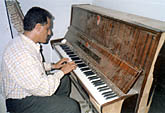
GIFA: Cry for Help! [Archives:1998/44/Culture]
November 2 1998
It is true that arts in Yemen, especially music, are not well supported. The [Jamil] Ghanim Institute of Fine Arts (GIFA) is the only institute teaching fine arts in Yemen. However, it is left to decline without any assistance.

Ridhwan Al-Saqqaf, Yemen Times Aden Bureau Chief, talked to Mr. Suhail Bin Is’haq, head of the Music Department and the Director of Research and Academic Studies Department at GIFA. Excerpts:
Q: Can you give us an idea about GIFA?
A: The Jamil Ghanim Institute for Fine Arts was established in 1973 by Mr. Jamil Ghanim and the artist Ahmad Bin Ghawdal. At the beginning, it offered free evening music classes. One year later, a section was opened for teaching drama. It was supervised by the Egyptian drama and theater expert Sami Abdounnabi.
Later, Dr. Abdulaziz Darwish opened the Plastic Arts section. It continued as evening classes at the institute until November 5, 1979. After that Saleh Bin Ghawdal was appointed director general of the institute.
Q: How many classes graduated from GIFA until now?
A: From 1982 up to date, 14 classes have graduated from this institute, comprising 425 students. They graduated with the equivalent of a secondary school certificate in the following subjects:

2. 67 students from the Theater Department.
3. 236 students from the Plastic Arts Department.
We don’t accept students here unless they have individual talents in any aspect of arts. We then train them to be professionals through academic study. Our teachers are Yemenis with high degrees. Most of the teachers graduated from our institute and then took higher degrees from abroad. Now, we have to face the challenge of rebuilding this institute from scratch.
Q: What art departments are there in GIFA?
A: Music, theater, and plastic arts. We are now planning to open a department for acoustics and vocals.
Q: Where do students go after graduating?
A: Some go to work at the Ministry of Culture. Others go to work for private teams. Now, we try to have them graduate with more personal skills that qualify them to stand tall by themselves.
Q: What are your future plans?
A: Firstly, we want the Ministry of Culture to provide us with financial support. If that is done, we plan to enlarge the exhibitions hall, to rehabilitate the learning stage and to build a new theater. We also want to provide the place with air-conditioners and a bus.
Q. Why don’t you look for support from the private sector?
A: We’ve tried that many times but it did not work. Some private institutions do not give us specific answers and others do not answer us at all. For example, on May 20, 1998, we asked for support from the Hail Saaid Group of Companies. We wanted them to provide the exhibitions hall with equipment and in return we would name it as the Hail Saaid Hall. Until now, they have not answered us.
Q: Any last word?
A: All that I want to say is that I hope people value art better and that the Ministry of Culture support us. I leave it for you to send them the message which I hope they understand.

Q: This institute is in a terrible condition. What is the reason behind that?
A: The institute is not supported by anyone in any way. People here do not find any importance in the arts, relevant authorities do not pay it any attention and no budget is allocated to it, despite the fact that it is the only institute of fine arts in Yemen.

A: The monthly budget allocated for the institute by the Ministry of Culture is YR 50,000. They do not support us at all. Imagine that they refused to give us YR 30,000 to equip the institute. This is happening while hundreds of thousands goes on salaries for officials. We don’t know how we will manage to continue teaching this year. We asked for a new budget but it did not work. We have been talking to officials at the Ministry of Culture since 1997 about getting a budget for us, but they still don’t care.
Q: What about your teaching staff?
A: All of them are Yemenis. They are paid YR 100 a lecture, which is very little. Most of our teachers, by the way, are graduates of this institute who completed their higher studies abroad.
Q: What is the best way to solve GIFA’s problems?
A: We have asked officials for support but this did not work. So, I think that the President himself and the Prime Minister should intervene to put an end to this carelessness. Only they can improve the situation.
——
[archive-e:44-v:1998-y:1998-d:1998-11-02-p:./1998/iss44/culture.htm]


